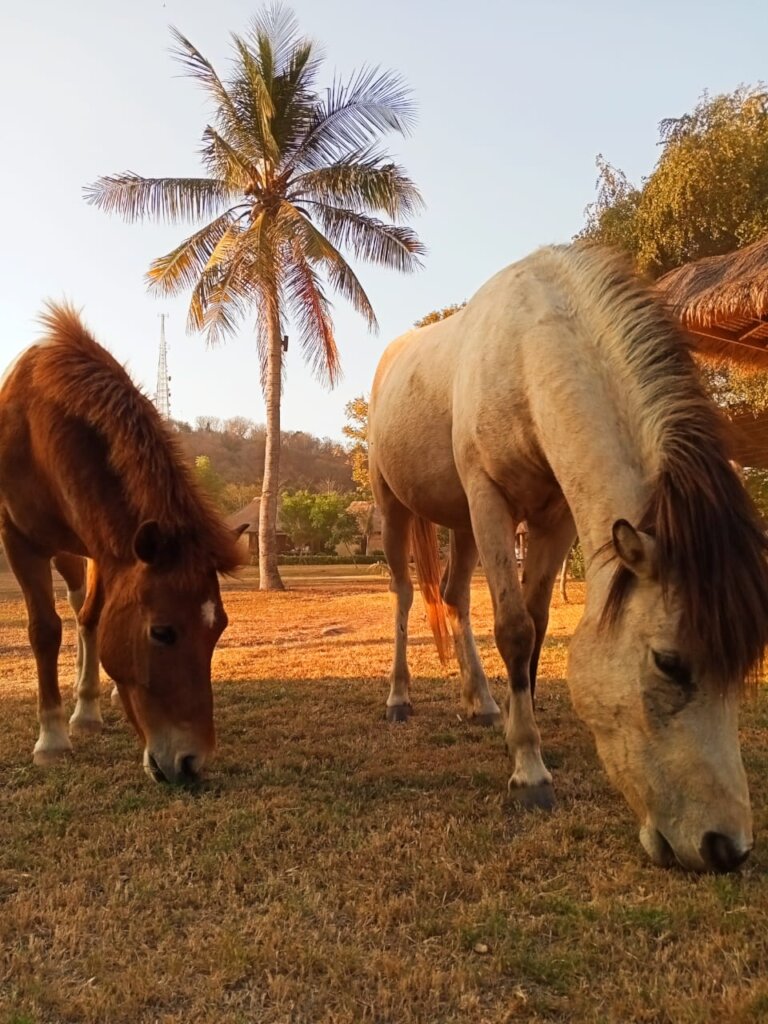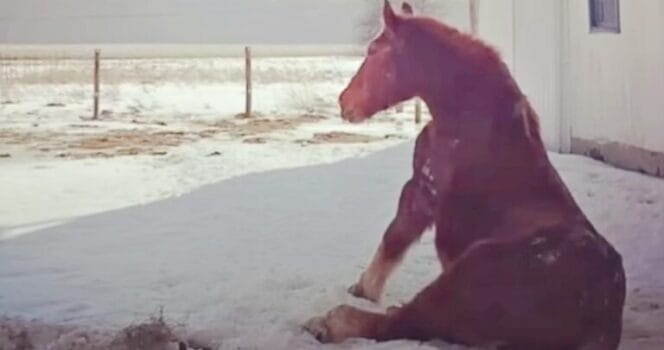A Story of Waiting and Hope
For nearly a decade, Gidget, a senior horse with a weathered mane and gentle eyes, knew only silence. Her world was reduced to a small enclosure, a chute of oats each morning, and the quiet rhythm of passing seasons. Her loyal human companion had grown too old to care for her, and though he loved her deeply, time and circumstance left her in solitude.
There were no herds to gallop with, no soft whinnies exchanged at dusk, no warmth of another creature nearby. Horses are social animals by nature, and Gidget’s loneliness reflected something deeply human — the quiet ache of waiting for connection.
But fate had a different ending in store. When Mockingbird Farm Sanctuary, a small refuge for farm animals in need, learned about her story, everything began to change.

A New Beginning at Mockingbird Farm Sanctuary
Founded in 2015 by animal advocate Jonell Chudyk, Mockingbird Farm became a place where neglected or abandoned animals could find safety, care, and belonging. When word reached Jonell about a 29-year-old horse who had spent years alone, she knew she had to help.
The day Gidget arrived was one filled with gentle wonder. Her hooves touched the soft earth of the sanctuary for the first time, her nostrils flaring as she breathed in the scents of hay, grass, and life. Around her were other animals — horses, goats, pigs, and miniature ponies — all living out their days in peace.
Gidget’s eyes, once dulled by solitude, seemed to brighten. She looked around not with fear, but with cautious curiosity. For the first time in years, she was not alone.
An Unlikely Friendship
Jonell had expected Gidget to gravitate toward the other full-sized horses, perhaps rekindling her instinct to belong to a herd. But love and friendship often bloom in unexpected places.
Gidget’s heart found a kindred spirit in Peggy — a miniature horse with a history of her own. Peggy had also lived in quiet isolation before coming to Mockingbird Farm. Together, the two formed a bond that surprised everyone.
Jonell described how Gidget would make a soft, rumbling sound whenever Peggy was near — a sound similar to a “purr.” For horses, such vocalizations are rare and typically express deep comfort and contentment. It was as though Gidget had rediscovered joy through the simple act of companionship.
Their friendship became inseparable. They grazed together, rested side by side, and greeted each new day with shared calm. For two souls that had waited so long to be seen, they became each other’s reflection of peace.
The Science of Animal Companionship
While stories like Gidget’s often touch our hearts, modern science offers fascinating insights into why such bonds matter so much — both to animals and humans.
Horses are herd animals with strong social instincts. Research published in the Journal of Veterinary Behavior has shown that isolation can cause stress in horses, manifesting as restlessness, reduced appetite, or repetitive behaviors. Social contact, by contrast, releases oxytocin — often called the “love hormone” — which promotes calmness and emotional balance.
This isn’t limited to horses. Studies on many social species, from elephants to dogs, reveal that companionship reduces cortisol (a stress hormone) and strengthens immune function. Emotional bonds, it seems, are not a human invention but a biological necessity across the animal kingdom.
In Gidget’s case, Peggy became more than a friend — she was the living medicine that restored peace to a weary heart.
The Mythic Symbolism of the Horse
Across cultures and centuries, horses have symbolized freedom, endurance, and spirit. In ancient mythology, they bridged the divide between the human and natural worlds.
In Greek legend, Pegasus — the winged horse — represented transcendence and the power to rise above hardship. In Native American culture, horses were seen as sacred allies, carrying messages between humans and the divine. In Celtic lore, the horse goddess Epona embodied fertility, protection, and companionship.
Gidget’s story echoes these timeless symbols. Though she did not soar through the skies or gallop across battlefields, she embodied another kind of strength — the quiet courage to endure and the grace to love again.
Her meeting with Peggy could even be seen as myth made real: two spirits once wandering alone, united in a moment of destiny.

Emotional Intelligence in Horses
Science continues to uncover remarkable evidence of emotional depth in horses. Research from the University of Sussex found that horses can recognize human emotions by reading facial expressions and tone of voice. Other studies suggest they form long-term memories of both humans and other horses, responding with affection to those who treated them kindly, even after years apart.
When Gidget “purred” in Peggy’s presence, it might have been a physiological response to safety and trust — a phenomenon similar to how humans sigh or hum when content.
This behavior supports growing evidence that animals possess emotional intelligence that parallels our own in profound ways. Their expressions of empathy, loyalty, and even grief challenge us to rethink what it means to be sentient.
The Power of Second Chances
Gidget’s story could easily have ended in silence. Yet through the compassion of one sanctuary, she found not only safety but the connection she had been missing for nearly a decade.
Mockingbird Farm’s mission reminds us of the quiet importance of giving animals — no matter their age — a second chance. Many senior animals are overlooked due to their declining health or limited years ahead. But as Gidget and Peggy showed, even in later life, there is room for transformation.
The sanctuary’s caretakers often say that rescue is not just about survival, but about restoring dignity and joy. For Gidget, this was her final gift: to know she mattered, to feel companionship once more, and to spend her last chapter surrounded by love.
Cultural Reflections: Lessons from Animal Friendship
Throughout history, humans have told stories of unlikely friendships — a reminder that compassion crosses species and circumstance. From Aesop’s fables to modern viral videos, these tales endure because they speak to universal truths.
Gidget and Peggy’s connection invites reflection on our own relationships. Just as Gidget waited patiently for connection, many of us navigate seasons of loneliness before finding companionship that feels fated. Their story suggests that love, in all its forms, is not bound by language or size but by mutual understanding.
In Japanese Shinto belief, animals are considered messengers of the gods, embodiments of natural harmony. Gidget’s story fits beautifully within this view — a simple act of meeting that radiated balance and meaning.
A Quiet Legacy
After Gidget’s passing, Peggy continued to find comfort through companionship with another miniature pony in need. It was as though Gidget’s spirit had left behind an invisible thread, guiding Peggy to share the same warmth she once received.
Mockingbird Farm shared her story publicly not to dwell on sadness, but to celebrate love’s continuity. “Though no one will ever replace Gidget and the very special relationship they shared,” the sanctuary wrote, “Peg did find companionship with another who desperately needed her too.”
In the gentle rhythms of sanctuary life, Gidget’s presence still lingers — in the echo of soft hoofbeats, in the shared meals at dawn, and in the quiet moments of care that define the farm’s purpose.
What Gidget Teaches Us About Connection
Gidget’s journey is more than a rescue story. It is a reflection of something deeply human — the need to be seen, understood, and loved. Her transformation from loneliness to joy reminds us that healing often begins not with grand gestures but with companionship.
In a world that can feel increasingly disconnected, her story invites us to slow down, to notice the beings — human or animal — who might be quietly waiting for kindness.
Whether through science, culture, or simple observation, one truth becomes clear: compassion is not a luxury of emotion; it is a force of nature that sustains life itself.
Conclusion: The Mystery of Empathy and the Wonder of Connection
From myth to biology, from sanctuaries to human hearts, Gidget’s story bridges the worlds of science and spirit. It reminds us that empathy — that quiet, invisible current — binds all living things.
Perhaps this is why such stories resonate so deeply. They reveal not only the intelligence of animals but the capacity for love that exists in every form of life.
In the end, Gidget’s greatest legacy is not her age, nor even her rescue, but the timeless truth she represents: that companionship heals, love endures, and every living being deserves the chance to belong.
And as long as such stories are told, our collective curiosity — about the minds and hearts of animals — will continue to guide us toward understanding, compassion, and wonder.
Sources
-
www.theanimalclub.net
-
Journal of Veterinary Behavior, Elsevier
-
University of Sussex – Research on Horse Facial Recognition and Emotion
-
Mockingbird Farm Sanctuary official updates and GeoBeats Animals interviews

